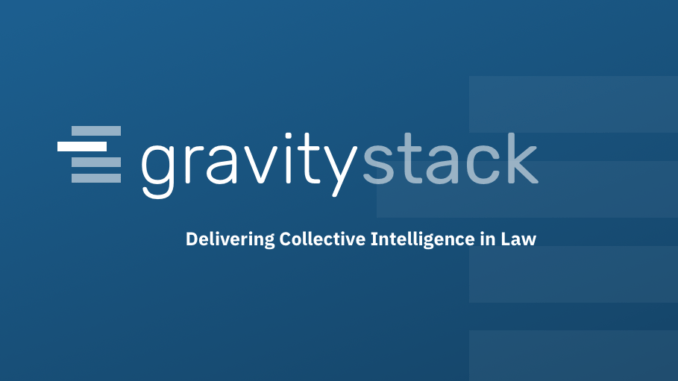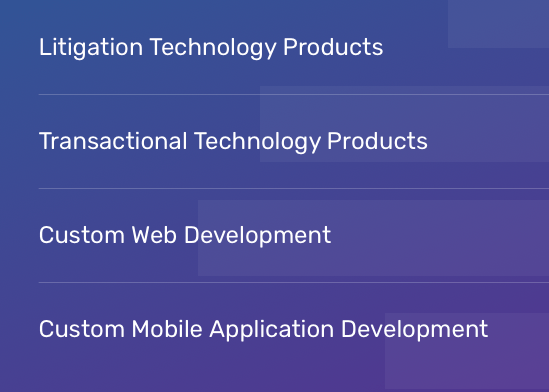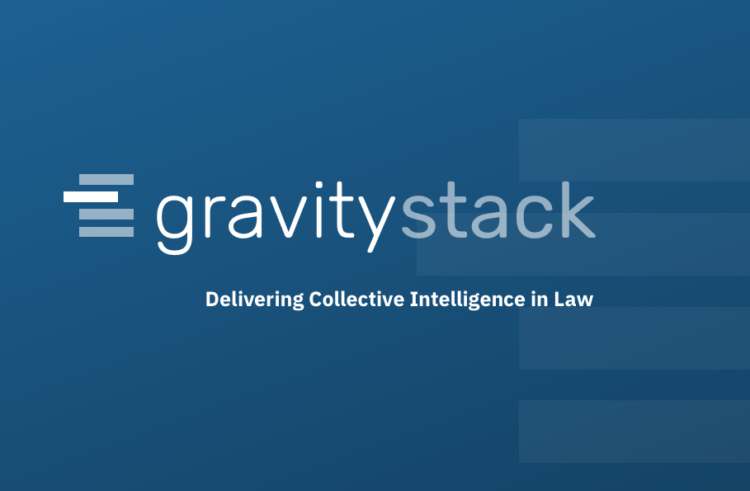
There are law firms that make their own technology, there are law firms that invest in legal tech companies, and there are also firms that have built consultative services to help clients with tech issues. But, when it comes to GravityStack, which is a wholly owned subsidiary of US-based law firm Reed Smith, they have taken things to another level.
They are building and selling their own tech products to the market, including to other law firms. Now, that is different, and arguably places it partly in the same field as other legal tech companies, (in fact, one of its products is now featured in the AL 100 – see Periscope below).
Artificial Lawyer caught up with Bryon Bratcher, founder and Managing Director of GravityStack (GS), to hear some more.

Bratcher explains that he had been working at Reed Smith for a decade and helping to develop and/or manage solutions in the area of large ediscovery projects and major investigations in the US.
Part of this involved helping clients not just to understand how to best solve a problem they had with technology, but to also develop solutions for the clients, i.e. building software inside the law firm for the clients, or that the lawyers at Reed Smith would use for the clients.
Either way, the focus was on actual use cases and really using those technologies they worked with, had improved upon, or developed themselves. It was a very organic and demand-led approach, rather than speculative.
However, as the group began to develop their own software that could be licensed to other law firms, as well as clients, it became clear it made more sense to spin it out into a subsidiary. Hence, GS was born earlier this year.
It now has around 30 people contributing to projects, some of whom are still Reed Smith full-timers, who bill their GS time back to the firm. Bratcher adds that Reed Smith remains the GS group’s biggest client – for now.
So, what is GS’s plan? Bratcher explains that there are four main legs:
Systems counselling, which is in effect a vendor advisory service, helping buyers choose what’s best for them.
A managed legal services group, which handles large, data-driven review matters and makes use of the tech that GS and Reed Smith already have in place.
Data solutions, which are aimed at GS helping clients better understand and get value out of their structured and unstructured data (i.e. legal text). This can be especially useful for litigants that want to analyse and find key data and insights that may contribute to winning a case.
And finally, the big enchilada, at least from Artificial Lawyer’s perspective: product development and deployment, which fundamentally is about creating and selling their own legal tech products to the market.
Part of this work is related to litigation and its Periscope project is a great example of what they are able to build.
Bratcher explains that Periscope is an ediscovery tool that works with the well-known Relativity platform and helps clients to measure the speed and accuracy of matter reviewers. As it gathers this data it can also help clients, or law firms, measure and model cost metrics of the review/discovery project.
And here is the bit where Bratcher says they really stand out: loads of real world testing.
‘We have done over 3,000 projects inside Reed Smith with Periscope, over four years,’ says Bratcher, adding that this all happened BEFORE they sold it to anyone else.
The belief is that this will result in better products that really do what lawyers want for the simple reason that it has been tested thousands of times by Reed Smith.
If the firm’s lawyers wanted changes, they were made. If it didn’t do what they expected, it could be tweaked. Result: the end product meets real world needs. In short, it’s a ‘good product’.
There are other projects in the works, including one related to transactional review. They also have a financial stake in legal AI company Heretik, which is also designed to operate within the Relativity platform and is also focused on transactional matters such as due diligence (see AL 100 listing).
This all sounds fascinating and impressive, given that not every law firm has an innovation team that is fully empowered to make a real difference. But one question keeps coming to mind: is it a strategic risk to sell good software to other law firms…?
Bratcher says: no.
‘We are offering our solutions to anyone interested, including direct competitors, as one of our major goals is to benefit the industry for the greater good,’ he says.
‘The more adoption we attain, the more efficiency gained for end customers. However, some firms won’t engage with us due to the competition issue. Others realise the functionality value and see a larger upside to gain more business,’ he adds.

But, there is still one last question that seems to be a potential elephant in the room: can a law firm really develop automation-based technology that could result in significantly changing how lawyers work? I.e. why disrupt a manual process that some partners may rely upon to create billable hours?
Are law firms to some extent existentially limited in what they can build themselves, can they really build tech that may put themselves out of a nice legal bill, even if the clients might applaud such new tech?
Bratcher considers this for a moment, then says: yes, they can.
‘I don’t look at that [the billable hours]. I see this tech as an opportunity to get more business because of the value it delivers,’ he explains.
Artificial Lawyer has to agree. Even if on face value automation of review work, for example, appeared to reduce some billable hours, the bigger picture is that it delivers such great value for the clients that they will likely then offer the law firm more work, which it is now more able to take on. I.e. more automation increases the ‘productive capacity’ of a firm.
And, one might add, most clients are getting tired of paying for excessive manual review costs. Better then to be where Reed Smith is and be one of the firms embracing automation.
Bratcher adds: ‘There is tremendous value in AI.’ He notes that this support does not come without some caveats regarding making sure there is sufficient data, that it is ‘clean’ data, and that any attempt to reach a certain level of accuracy will depend upon the particular use case.
But, he acknowledges – as one would expect from a legal tech expert who works with legal AI companies such as Heretik – that ‘the more you train an AI system the better it is at accuracy’. And he adds: ‘If there is a specific use case and it is trained for that then AI can be very robust.’
And finally, as someone who is at the centre of the legal tech and to some degree the automation whirlwind, what does he think about its impact on jobs?
Bratcher says that it will impact paralegals, for sure. Far less so lawyers who are really using their skills. But for paralegals, in the future he suggests they will need to have a range of expertise including: transactional skills, tech capabilities and project management. However, he notes that even with these new hybrid-type paralegals there will probably be less of them in total in the future.
To conclude, Gravity Stack is an impressive, tech-creating organisation, even more noteworthy when one considers it has been born out of a law firm – which are not usually the most focused businesses when it comes to tech R&D.
Is it a tech company? Is it a consultative business? Is it an internal innovation resource? Probably it is all three of those things put together with a focus on data, process and, much to Artificial Lawyer’s pleasure, leveraging automation in conjunction with human lawyer work.
Where Bratcher and the team go now remains to be seen, but given the huge demand for transformation in the legal market then it seems safe to say the future is bright for GS.

2 Trackbacks / Pingbacks
Comments are closed.